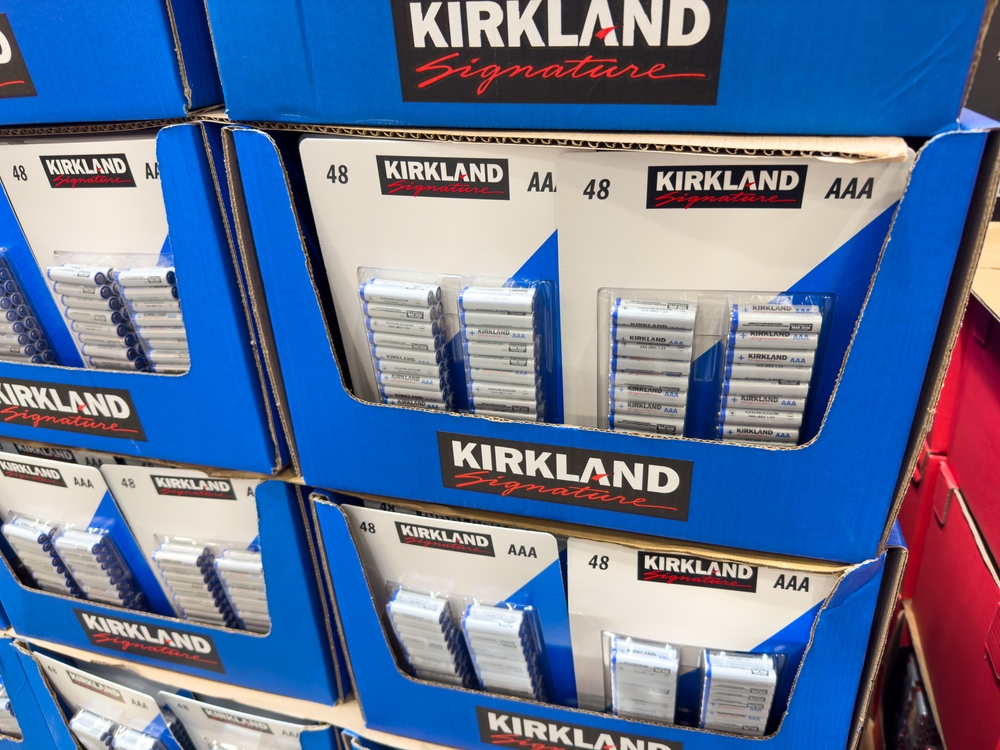
Most shoppers assume that a higher price means better quality, but that’s not always the case. Many store-brand and private-label products are made in the same factory as their premium counterparts, using the same ingredients, processes, and equipment. The only real difference is the name on the label—and sometimes, the price tag can be twice as high. Learning which items come from the same source can help you save big while keeping your grocery list filled with trusted favorites. Here are ten surprising examples of everyday products made in the same facility as big-name brands.
1. Kirkland Signature Batteries and Duracell
If you shop at Costco, you’ve probably seen the Kirkland Signature batteries sitting next to Duracell. What many people don’t realize is that both are produced in the same factory that supplies Duracell’s top-tier alkaline line. The result is comparable quality and performance without the premium price. These batteries last just as long in remotes, toys, and flashlights. It’s one of the easiest ways to cut costs on household essentials without losing reliability.
2. Trader Joe’s Yogurt and Stonyfield Organic
Trader Joe’s shoppers love their store-brand yogurt, and for good reason—it’s reportedly made in the same facility as Stonyfield Organic. Both use high-quality milk and live active cultures for that rich, creamy texture. The taste and nutritional content are almost identical, but the Trader Joe’s label skips the extra cost of national advertising. This is a perfect example of how a lower price doesn’t always mean lower quality. When it comes to yogurt, sticking with the Trader Joe’s version is an easy way to save.
3. Great Value Peanut Butter and Peter Pan
Walmart’s Great Value peanut butter has a nearly identical taste and texture to Peter Pan because they’re made in the same factory. Both brands use roasted peanuts, a touch of salt, and stabilizers to maintain smooth consistency. Since they share the same manufacturing process, it’s no wonder taste tests often end in a tie. Choosing Great Value means paying less for the same classic peanut flavor. For families that go through jars quickly, those savings can add up fast.
4. Kirkland Signature K-Cups and Green Mountain Coffee
The relationship between the store-brand Kirkland Signature K-Cups and Green Mountain Coffee (now part of Keurig Dr Pepper) is a standout example of value and quality aligning. According to multiple sources, Green Mountain is the manufacturer behind Costco’s Kirkland K-Cup packs, meaning they are produced in the same factory or manufacturing line as the national-brand pods. The implication for shoppers is clear: when you buy Kirkland K-Cups, you’re getting coffee made by the same experts who supply Green Mountain pods, but at a lower price.
5. Aldi’s Millville Cereal and Post
Many Aldi shoppers swear that Millville cereals taste like Post favorites, and that’s because they often come from the same facility. The recipes and ingredients are nearly identical, though the packaging and marketing are different. By eliminating national advertising costs, Aldi keeps prices low while maintaining quality. From crispy flakes to crunchy clusters, these cereals deliver the same familiar breakfast experience. Once you try the store-brand version, you may never go back.
6. Costco’s Coffee and Starbucks
Coffee lovers might be surprised to learn that some Kirkland Signature coffee beans were roasted by Starbucks. Both came from the same factory operations, ensuring consistent roasting techniques and quality beans. The flavor profiles are remarkably similar, whether you prefer medium or dark roast. Kirkland coffee cost significantly less while maintaining that signature Starbucks aroma. It was a budget-friendly way to get a premium morning brew without leaving home.
7. Kirkland Signature Foodservice Foil and Reynolds Wrap
Kirkland Signature’s Foodservice Foil is one of the few store-brand products openly co-branded with its national counterpart, Reynolds Wrap. The packaging itself reads “Kirkland Signature Reynolds Foodservice Aluminum Foil,” confirming it’s made in the same facilities and to the same standards as the Reynolds version. You get identical strength, thickness, and reliability—ideal for baking, grilling, or meal prep—at a lower price. For shoppers, this is a rare case where the store brand truly is the same product from the same factory, just with a different label and a smaller price tag.
8. Walmart’s Great Value Ice Cream and Blue Bunny
Walmart’s Great Value ice cream is manufactured by Wells Enterprises, the same Iowa‐based creamery behind brands like Blue Bunny and Halo Top. Because they share the same production facility and expertise, the Great Value version delivers freezer‐aisle quality at a much lower price. Many blind taste tests show minimal difference in flavor or texture between the name‐brand and store brand versions. Choosing the store version allows for serious savings without sacrificing dessert indulgence. For shoppers buying ice cream frequently, that budget win adds up quickly.
9. Kirkland tuna and Bumble Bee
Canned tuna is a staple in many pantries, and Kirkland Signature’s Albacore Solid White Tuna is actually produced by Bumble Bee, a major player in the commercial seafood industry. That means these two labels are made in the same facility under almost identical processes. You get the same wild-caught style and packing standards for a fraction of the price. Stocking up on Kirkland tuna yields big savings without a taste penalty.
10. Publix Brand Frozen Vegetables & Green Giant
Many shoppers don’t realize that some of the frozen vegetable bags under Publix store brand are produced in the same factory or by the same vegetable processing line used by Green Giant, according to credible reporting. For example, a 2024 article notes that certain Publix-branded frozen veggies originate from the manufacturer of Green Giant’s frozen vegetable varieties. That means when you buy the store-brand bag you may be getting nearly the same product, with the same standards for freezing, packaging and quality, but often at a lower cost.
How “Same Factory” Knowledge Saves You Money
Once you understand how many items come from the same factory as their premium versions, you’ll never look at grocery shelves the same way again. These hidden connections prove that branding and advertising often drive prices more than production quality. By paying attention to store-brand labels, you can save hundreds every year without sacrificing taste or performance. Whether it’s batteries, coffee, or ice cream, these quiet manufacturing overlaps offer real value. Smart shoppers know the secret—and now you do too.
Have you discovered any same facility products that impressed you? Share your finds in the comments below!
What to Read Next…
- 12 Surprising Name-Brand Foods You Can Actually Find at Dollar Tree
- The Hidden Ingredient in Some Store Brands That Means You’re Paying More for Less
- 8 Major Brands Pulled from Shelves for Hidden Dangers
- The Candy Brand That Never Changes Its Recipe — and It’s Still Outselling a Lot of Competitors
- These 5 New Coffee Brands Taste Better Than Your Old Favorites
The post 10 Products That Are Made in the Same Factory as the “Premium” Brands appeared first on Grocery Coupon Guide.







